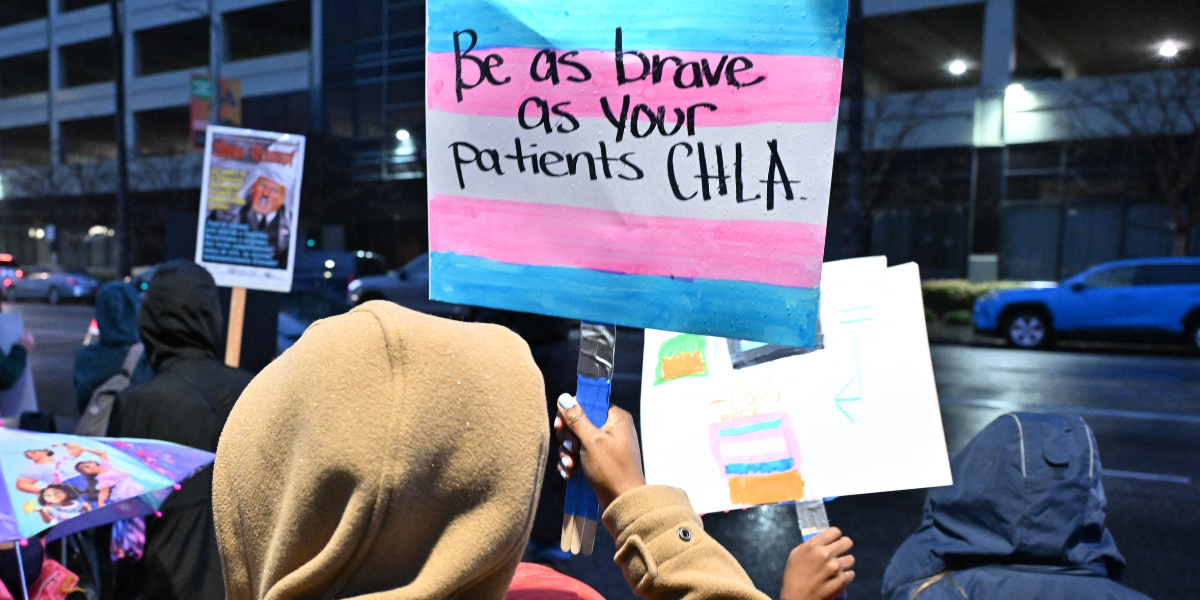I’m being sarcastic when I say I’m surprised that Republicans across the nation are using their positions of power to take valuable health care resources away from women in their states. In fact I’m totally just kidding. I’m not surprised at all.
In fact, this make 100 percent sense since the GOP has been waging war on women for quite some time now. And it’s still about the same thing: reproductive justice. And I’m calling it that because I get it, sometimes it is weird that queer women care about abortion, but the ability to control our bodies is getting serious: bills that de-fund Planned Parenthood and are called “The Heartbeat Bill” are coming to state politics near you. This isn’t just about abortion: it’s about the fact that our bodies are being controlled and policed by bodies that don’t look, sound, or live like us. And they aren’t on our side.
Elections are coming this November and the United States looks like this:
(In case this is hard to decipher, deep purple means bans on abortion already exist. Lavender means abortion coverage is in danger. And grey means it will be soon.)
I’m going to cover abortion bans state-by-state that are happening right now, right this moment, to bodies in that state.
Kansas Almost Lost All Its Abortion Providers
New licensing regulations in Kansas were shutting down abortion clinics and putting Kansas at risk of becoming the first state in which zero abortion providers exist.
This is obviously because zero unplanned pregnancies and zero cases of pregnancy from rape and incest will occur in Kansas this year, right? Like, that’s the only way, right?
Kansas Governor Sam Brownback signed a law early this June forcing abortion providers to meet new regulations – a ton of them. They include provisions on the size of Janitor’s Closets, and the temperature. The checklist is over 200 items and 30 pages long. And abortion providers had until July 1 – two weeks from when the new guidelines were released – to meet them all.
Luckily at the very last minute, U.S. District Judge Carlos Murguia issued an order to temporarily block Kansas from enforcing new rules for its abortion providers.
Planned Parenthood was able to snag a license late Thursday but The Center for Women’s Health had doctors cancel the inspection because “they know they won’t get approved.” But Dr. Herbert Hodes and his daughter, who run the center, disagree, and their lawsuit is what inspired Murguia’s temporary block.
And it might be causing a tide of similar lawsuits from the other applicants:
The suit calls the new rules “ambiguous and unclear” and says the law imposes, “burdensome and costly requirements that are not medically necessary or appropriate and that are not imposed on Kansas medical providers performing other comparable procedures.”

Anti-choice activists say that the clinics are just trying to get around the law because they all failed to meet “minimum health and safety standards.” Obviously abortions can’t safely be performed in a facility that doesn’t have a toilet in the staff dressing room.
Aid for Women is expected to file its own lawsuit today, and the Overland Park Planned Parenthood is considering doing the same, even though its license application is still pending. All three abortion clinics are in the Kansas City area, and an attorney representing the Center for Women’s Health notes that if they’re shut down, the nearest location for a woman to receive a first-trimester abortion would be Columbia, Missouri, and the nearest location for a second-trimester abortion would be St. Louis. That means a woman living in central Kansas would have to drive about six hours or eight hours to get a safe and legal abortion.
Six or eight hours to get a safe and legal abortion. Does that sound like zero?
Texas Wants Planned Parenthood to Work Hard for the Money
The reason Kansas’ government is using a 200-item checklist to take abortion care away from women is because it’s difficult to actually straight-up defund a Planned Parenthood. That sounds surprising, since so many Planned Parenthood attacks have occured recently. But federally, blocking Planned Parenthood money is very hard, because PP provides much more than abortions. Plus, there’s that whole Hyde Amendment thing that makes federally funded abortions impossible, not that any lawmakers have heard of it. And in Texas, PP patients have been paying for their own abortions since 2005.
Planned Parenthood, in fact, actually provides many women in Texas access to cancer and diabetes screenings. And since it’s all they could get, Texas lawmakers passed two measures this month eliminating those by getting rid of the state’s family planning program. That’s not zero abortion clinics: that’s 300,000 women losing access to life-saving resources at reasonable costs.
Texas Governor Rick Perry reduced the state budget for family planning from $111 million to $37 million. Obviously not a big deal. And then this Monday state lawmakers put Planned Parenthood on the bottom of a new tiered distribution system for those funds. So what does this mean for horrible cancer and diabetes screening providers Planned Parenthood? Well:
 “It doesn’t completely defund us, but it puts the agency in a position where they have to put us third in line for the money,” said Yvonne Gutierrez, a spokesperson for Planned Parenthood of South Texas. “And it’s not only us that’s in the third tier — it’s all the traditional family planning providers that don’t provide comprehensive care, many in rural areas. So it’s the hard to reach population that’s really being affected by this.”
“It doesn’t completely defund us, but it puts the agency in a position where they have to put us third in line for the money,” said Yvonne Gutierrez, a spokesperson for Planned Parenthood of South Texas. “And it’s not only us that’s in the third tier — it’s all the traditional family planning providers that don’t provide comprehensive care, many in rural areas. So it’s the hard to reach population that’s really being affected by this.”
Texas Planned Parenthood offices have two avenues through which they receive state and federal money: the Women’s Health Program (WHP), which is funded by Medicaid, and the state family planning program, which is funded by the Title X federal grant program. In addition to putting private providers like Planned Parenthood last in line for Title X funds, GOP lawmakers inserted language into the new Medicaid bill that will prevent WHP money from going to any entity that provides abortions or is affiliated with an abortion provider.
Half of 120,000 low-income women that use the WHP do so through their local Planned Parenthood clinic. Does that sound like zero or like 60,000 women who can’t afford other forms of care and now have nothing to rely on?
And even what they rely on is running short as Republicans cut back on medical providers across the state:
“If they’re gonna kick Planned Parenthood out of the program, then all of these women going to a Planned Parenthood clinic are gonna have to go to another provider — and these providers are already operating at capacity,” Gutierrez told HuffPost.
Texas is probably breaking federal Medicaid rules by discriminating against Planned Parenthood – and if the state is found guilty of doing so they’ll lose up to 150 million federal family planning dollars. It’s a lose-lose, and guess who isn’t winning? Women.
The Only Good Thing in Texas now is that the Center for Reproductive Rights has filed an injunction against the state for its abortion practices, outlined in new, recent legislation. Thank Whoever, because Texas abortion providers are now required to give women sonograms prior to their procedure and describe their fetus in great detail. Clearly this is to make the process more streamlined, efficient, and pleasant for women. I think the best part is when she gets to listen to the heartbeat. And of course there is now a waiting period, of up to 72 hours.
The lawsuit accuses the state of imposing political requirements on doctors, thus “hijacking” the patient/doctor relationship. (Doctors who do not comply will be stripped of their licenses.) Oh, and they think the new regulations are sexist. Cross your fingers and keep them crossed, because this lawsuit might make bring an end to a recent tidal wave of mandatory sonogram laws across the nation.
Ohio Seemed Irrelevant Until “The Heartbeat Bill”
I am sorry to be the bearer of bad news in this case. It’s really bad news. It feels overwhelming, right? But don’t worry. The people trying to take women’s health care away are also responsible for this badly-produced, way-too-dramatic ad about how a fetus that isn’t a baby yet has a heartbeat and therefore you should buy balloons for them. It’s tacky, so I feel bad. It just could have been so much better if it had never happened at all:
The Ohio House passed this bill 54-43, and it’s the most restrictive abortion law on the books. Detection of a heartbeat? That does not sound like Roe v. Wade. And that’s probably because the lawmakers working on it are blatantly ignoring the existing precedent from the 1973 case, which is viability, and are instead calling on fetuses to testify about abortion in court.
The state senate is next, and then the Governor’s desk. I hope that by this point you understand what I’m trying to say. Governors suck. And so do these measures.
Two representatives in the state said it right about this one:
Said pro-choice State Representative Connie Pillich on the floor, “The only jobs this bill will create is back alley butchers who are sharpening their knives,” according to Planned Parenthood of Ohio’s Twitter feed.
And another representative addressed anti-choice members: “You should feel uncomfortable about this vote. A fetus now has more rights than a woman.”
Indiana Isn’t Defunding Planned Parenthood… Yet
Tanya Walton Pratt is saving Indiana from really embarrassing themselves. She’s a federal judge who ruled last Friday that Indiana could not, in fact, cut off Planned Parenthood funding because it provides health care to low-income women. She explained that the law conflicts with Medicaid policies that allow beneficiaries to choose their health care providers. And that’s what Planned Parenthood is: a health care provider. Not an abortion clinic and not a political tool. A health care provider.
“States do not have carte blanche to expel otherwise competent Medicaid providers,” Judge Pratt said. And “there are no allegations that Planned Parenthood of Indiana is incompetent or that it provides inappropriate or inadequate care.”
The law has been in effect since it was signed by Governor Mitch Daniels on May 10. But as of June 20, Planned Parenthood of Indiana had stopped treating Medicaid patients and laid off two of three specialists in sexually transmitted diseases. Very few PP services involve abortion. Why doesn’t anyone but Judge Pratt know that?
Now it’s becoming Texas Part Two in the Hoosier state, where Planned Parenthood of Indiana and two of its patients have filed a lawsuit challenging the new restrictions. They call them “a blatant violation” of federal law. They’re right.
And a similar lose-lose to Texas, Indiana is risking losing over $5 billion annually in Medicaid funds. And guess what? Know who is still losing? Women. Judge Pratt said:
“Denying the injunction could pit the federal government against the State of Indiana in a high-stakes political impasse. And if dogma trumps pragmatism and neither side budges, Indiana’s most vulnerable citizens could end up paying the price as the collateral damage of a partisan battle.”
The Good News Is One Judge Prevented South Dakota From Being As Shitty
South Dakota Republicans were working hard to continue the anti-choice, anti-woman GOP strategy when out of nowhere, pow! boom!, came Chief Judge Karen Schreier to destroy the attempt. You can thank Bill Clinton, who appointed her. I’m going to put in a picture of Hillary Clinton caring about women’s rights now because I love her.
South Dakota was about to get a new fun abortion law that, as of yesterday, would have created a 72-hour waiting period before women underwent the process, the longest in the nation. Even better, it also included a forced visit to a crisis pregnancy center. This is an offensive slap to feminism and the pro-choice movement, considering CPCs distribute misleading and often religious-based information that shames and lies to women about their health choices and options.
South Dakota’s Governor, Dennis Daugaard, signed the law hoping “women who are considering an abortion will use this three-day period to make good choices,” since he is better at making choices than they are. Judge Schreier struck down the law for putting “an undue burden” on women and forcing them to go to a religious, non-medical third party. But that wasn’t all she said. She also asserted that the law was degarding to women, and her decision was the kind of thing that makes feminists sick of all of these weird laws and restrictions on our freedom all fuzzy inside:
“Forcing a woman to divulge to a stranger at a pregnancy help center the fact that she has chosen to undergo an abortion humiliates and degrades her as a human being. The woman will feel degraded by the compulsive nature of the Pregnancy Help Center requirements, which suggest that she has made the ‘wrong’ decision, has not really ‘thought’ about her decision to undergo an abortion, or is ‘not intelligent enough’ to make the decision with the advice of a physician. Furthermore, these women are forced into a hostile environment.”
South Dakota’s attorney general, however, is still making a decision on the law.
Look, I know that we here at Autostraddle like to win. All I do is win. Seriously. I even know all the words. But this election season, women are losing – and it’s because the GOP is stopping at nothing to strip us of our right to lead healthy lives. This isn’t about abortion. It’s about our bodies, and the way the government controls them. We’re being told what to do by a bunch of old white dudes in states that don’t contribute much to our overall happiness as queer chicks anyway. So what can you do?
You can vote for someone else in November, and you can donate to Planned Parenthood, and you can speak up. Because I know, it’s sometimes just so weird that lesbians care about abortion. But this is about much more than whether or not you’re at risk to wake up pregnant after having lesbian sex. It’s about your right to be free from the consequences of rape and incest, and to determine how you treat your body. It’s about being allowed to make mistakes and have a vagina. It’s mostly, actually, about the right to have a vagina. A safe one. A happy one.
It’s about women. And we’re not winning.










